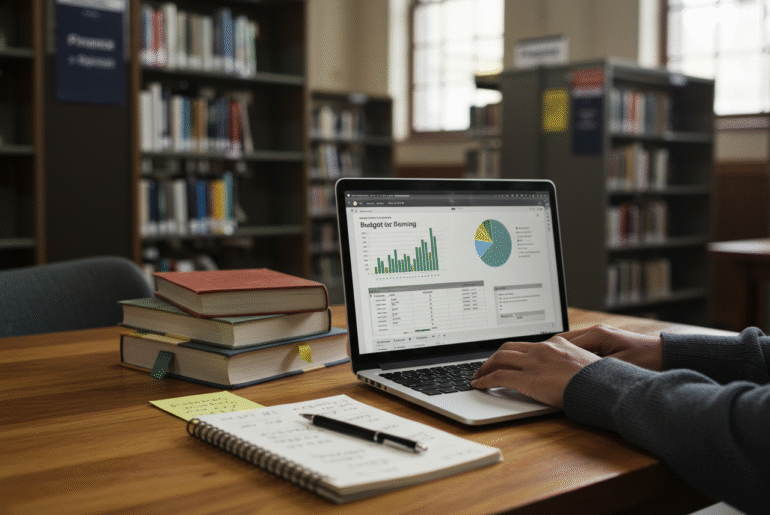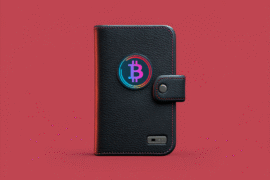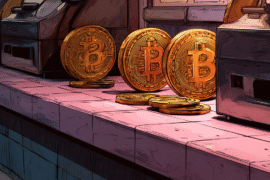This article may contain references to products or services from one or more of our advertisers or partners. We may receive compensation when you click on links to those products or services. Nonetheless, our opinions are our own.
The information presented in this article is accurate to the best of our knowledge at the time of publication. However, information is subject to change, and no guarantees are made about the continued accuracy or completeness of this content after its publication date.
Why Build a Financial Buffer in 2025
Unexpected money problems can happen at any time. Often, they come when you do not see them coming. That is why it is good to have a savings buffer, also called an emergency fund. This is extra money you set aside. It helps you keep your money in order when a sudden cost pops up. An emergency fund protects you from money problems, for example, medical bills, quick home fixes, or other last-minute costs. This buffer lowers worry and helps you stay calm when things get hard. In this blog, we will talk about why an emergency fund is important, how to start one, and how it can get you ready for life’s surprises.
What a Financial Buffer Means
Managing your money is not only about making a budget. It is also about getting ready for things that come up in life. A cash buffer helps you feel safe when surprise costs happen. This is like a backup fund that you keep in a different place from your usual bank accounts. You use it only when emergency things come up.
Having emergency savings is very important for handling things in life that can mess up your money plans. A backup like this helps you feel at ease and makes sure you are ready for anything that shows up.
How a Financial Buffer Supports Stability
A money buffer is very important for keeping your money safe when things get tough. It is like a cushion. This can help you when you have sudden problems, like losing your job or large medical bills. A buffer like this can give you some peace of mind.
If you have money saved for emergencies, you are less at risk of going into debt. This means you will not miss payments or feel worried about how to pay your bills. A safety net like this lets you feel calm, because you know you are ready if money problems come up.
Voted "Best Overall Budgeting App" by Forbes and WSJ
Monarch Money helps you budget, track spending, set goals, and plan your financial future—all in one app.
Get 50% OFF your first year with code MONARCHVIP
Why Saving a Buffer Matters
Life can change in a moment, and things can come up when you don’t see it coming. That’s why it is important to have some money saved. This money helps keep you safe from surprise costs. If you face things like sudden doctor bills or need to fix something at home fast, you will feel better knowing you have this money. A buffer like this helps you be ready for whatever comes your way.
Having a buffer means you do not need to borrow money as much. This helps to lower your stress. A good emergency fund helps to keep your money stable. It also makes you feel safe.
Protection Against Unexpected Expenses
Think about what happens when your car breaks down or you have big medical bills. You did not plan for these costs, but you still have to find the money to pay. A cash reserve helps you handle these money problems. It lets you solve things without stress. A cash reserve works like a shield. It keeps you ready for money surprises.
With an emergency fund, you do not have to use credit cards or take out loans when you need money. These choices might feel easy at first, but they can make you owe a lot over time. A savings buffer gives you a safe way to handle sudden expenses. It lets you pay for things now without making money troubles last for years.
Reducing Stress from Money Problems
Money problems can make you feel very worried. They might even keep you up at night. A bit of extra money can help take away that stress. It makes sure you have something saved for times when you need it. When you have extra cash for things like doctor bills or fixing your car, you feel better. Knowing the money is there gives you peace of mind.
This buffer helps with emergency costs and takes away money worries. It is a smart way to stop stress before it happens. It also makes your money situation and your mind feel better.
When a Financial Buffer Is Most Useful
Sometimes in life, you might need to get money fast. Having some extra money set aside can help a lot. A job loss, a health problem, or things breaking at home can all happen. If you have an emergency fund, you can take care of these issues without using credit or loans. This way, you can feel more ready for what comes up.
Handling Job Loss or Lower Income
Losing your job or seeing a drop in what you earn can feel like too much to handle. At those times, having some extra money saved up is helpful. A money cushion lets you stay okay with your bills and needs while you look for new work or get used to the change.
Without enough savings, it can be hard to pay your monthly expenses like rent or groceries. But if you have a buffer, you can get through this hard time without going into debt. This gives you some time to get a new job or make your income steady again.
Covering Medical Bills and Home Repairs
Unexpected medical bills or home repairs can put a lot of stress on your money. A doctor’s bill can add up fast. A broken roof or a tool at home that stops working must be fixed right away. If you do not have money put aside for these things, you might have to use a credit card or take out a loan to pay for them.
A money cushion lets you deal with these things fast and without money worries. If there is a sudden medical problem or something in your home needs to be fixed right away, your emergency savings can help you with these. You can take care of the problem without messing up your budget.
Ways to Start Your Money Buffer
If you want to feel more at ease with money, it helps to have a small money buffer set aside. This buffer is like extra money that you can use if something comes up. You can start by putting away a little bit each month. Even saving the smallest amount will be good. No amount is too small to get started.
Think about your spending. Try to see what you can cut back on to save more. A budget can be a good tool for this. When you get paid, try to save the money before you spend it. A simple plan like this works for most people.
Keep it somewhere safe, like a savings account that you do not touch often. Over time, your money buffer will grow. The most important part is to get started and stick with it. This way, you can feel ready for the hard times.
Basic Tools for Getting Started
You will need some tools to help you get started with this. First, make sure you have the right accounts set up. It is also a good idea to use budgeting tools to see where your money goes. The right tools will make it easier for you to manage your money, see how much you spend, and find ways to save. These steps will help you feel more in control of your money and plan for your future.
Building a money cushion starts when you pick the right place to keep your cash. Open a new savings account just for your emergency funds. This helps you keep it apart from your normal spending. You can use budgeting tools, like apps or simple spreadsheets, to track where your money goes. These can help you find extra cash that you can put into your savings.
Practical Steps for Saving Regularly
| Step | Action |
|---|---|
| Step 1 | Assess your monthly essential expenses. |
| Step 2 | Set a realistic savings goal, like covering three months’ worth of expenses. |
| Step 3 | Open a separate savings account for your emergency fund. |
| Step 4 | Set up automatic transfers to save regularly. |
If you follow these steps, you will slowly build a good money buffer. Even if you save a small amount each time, it will help as time goes on.
Conclusion
Having some extra money set aside is a good way to handle the times when you need to pay for something you did not plan. It helps you feel calm when there are money troubles. A buffer helps when you or your loved ones lose a job or you have a big medical bill. If you know why you need this and you follow the steps to save, you can feel less stress about these money problems. Saving money like this takes some time, but being prepared gives you peace and is worth what you put into it. Start building your safety net now so you are ready for anything that comes your way.
Frequently Asked Questions
How much money should my financial buffer have?
Your buffer should have enough to cover three to six months of important bills. This means things like rent, food, and things you have to pay every month. You should change the amount if your pay changes or if your own bills go up or down.
Where is the best place to keep a financial buffer?
You should put your buffer in another savings account. This helps you get to your money fast. It also keeps these savings safe and away from the money you use every day.
Can I invest my financial buffer instead of saving it?
You should not use this emergency money to invest. That is because investments come with risk and you may not be able to get your money right away. A savings account is better for money you might need in an emergency.
How often should I review my financial buffer?
Check your buffer often, especially if you get a new job or your bills change. This way, your savings stay big enough to cover any

Reviewed and edited by Albert Fang.
See a typo or want to suggest an edit/revision to the content? Use the contact us form to provide feedback.
At FangWallet, we value editorial integrity and open collaboration in curating quality content for readers to enjoy. Much appreciated for the assist.
Did you like our article and find it insightful? We encourage sharing the article link with family and friends to benefit as well - better yet, sharing on social media. Thank you for the support! 🍉
Article Title: Why a Financial Buffer Matters and How to Start One
https://fangwallet.com/2025/07/17/why-a-financial-buffer-matters-and-how-to-start-one/The FangWallet Promise
FangWallet is an editorially independent resource - founded on breaking down challenging financial concepts for anyone to understand since 2014. While we adhere to editorial integrity, note that this post may contain references to products from our partners.
The FangWallet promise is always to have your best interest in mind and be transparent and honest about the financial picture.
Become an Insider

Subscribe to get a free daily budget planner printable to help get your money on track!
Make passive money the right way. No spam.
Editorial Disclaimer: The editorial content on this page is not provided by any of the companies mentioned. The opinions expressed here are the author's alone.
The content of this website is for informational purposes only and does not represent investment advice, or an offer or solicitation to buy or sell any security, investment, or product. Investors are encouraged to do their own due diligence, and, if necessary, consult professional advising before making any investment decisions. Investing involves a high degree of risk, and financial losses may occur including the potential loss of principal.
Source Citation References:
+ Inspo
There are no additional citations or references to note for this article at this time.












































